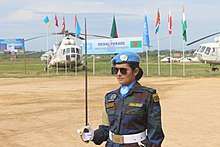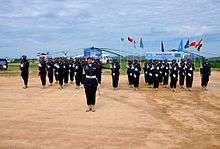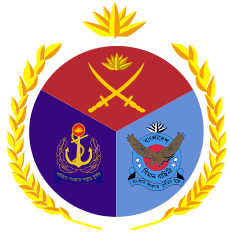Bangladesh UN Peacekeeping Force
The Bangladesh Armed Forces and the Bangladesh Police have been actively involved in a number of United Nations Peace Support Operations (UNPSO) since 1988.

History
Bangladesh's first deployments came in 1988, when it participated in two operations - UNIIMOG in Iraq and UNTAG in Namibia.[1] The then military dictator and President-elect of Bangladesh Lieutenant General Hussain Muhammad Ershad initiated these deployments in 1988 for the first time with UNIIMOG with 15 military observers.[2]
Later, as part of the UNIKOM force deployed to Kuwait following the Gulf War, the Bangladesh Army sent a mechanized infantry brigade of approximately 2,193 personnel.[1] In 1994, 1200 Bangladeshi peacekeepers were besieged by Bosnian Serbs in the Bosnia after replacing a French contingent during UNPROFOR operations. The Bangladeshi commander asked for NATO air cover which was not provided. This was in contrast to when the French UN peacekeepers were attacked and NATO responded by providing cover. Over a hundred peacekeepers died in the region, including Bangladeshi soldiers. The Bangladeshi soldiers were underequipped.[3] During the Rwandan Civil war, commander of UN forces in Rwanda General Roméo Dallaire alleged that Bangladeshi peacekeepers sabotaged their own vehicles in order to avoid going on patrols.[4]
Since then, the Bangladesh Army has been involved in up to thirty different UNPKO's covering as many as twenty-five countries.[1] This has included activities in Namibia, Cambodia, Somalia, Uganda, Rwanda, Mozambique, former Yugoslavia, Liberia, Haiti, Tajikistan, Western Sahara, Sierra Leone, Georgia, Congo, and Côte d'Ivoire. Bangladesh has sent its personal to at least 45 UNPKO and more than 83,000 personal of Bangladesh having served in those missions.[5]
In 2005, nine Bangladeshi peacekeepers were killed in Congo. Bangladesh had 1300 troops deployed in the country.[6] In 2007, allegations of misconduct against Bangladesh peacekeepers based in South Sudan emerged. Some personal were sent back to Bangladesh and faced disciplinary actions by the Bangladesh army.[7] As of October 2014, Bangladesh contributed the highest number of total personnel to United Nations Peacekeeping Operations, with 8,758 personnel attached to various UN peacekeeping forces worldwide.[8][9] In May 2015, one Bangladeshi peacekeeper was killed in a militant attack in Mali during MINUSMA.[10] In 2015, Bangladesh deployed the first all-female peacekeeping unit in Haiti, composed of 160 Muslim female troops.[11] The unit was the subject of the documentary Journey of a Thousand Miles: Peacekeepers.[12][13] Bangladesh trains peacekeepers in the purpose-built BIPSOT (Bangladesh Institute of Peace Support Operation Training).[14] In 2015, Bangladesh deployed boats to patrol the Niger river in Mali.[15] Bangladeshi peacekeepers were also deployed in UNAMSIL mission in Sierra Leone.[16] After the contribution made in the Sierra Leone Civil War, the government of Ahmad Tejan Kabbah declared Bengali an honorary official language in December 2002.[17][18][19][20]
Explanations why Bangladesh shows such a great commitment vary. One argument is that Bangladesh is able to improve its international reputation and build "soft power," which enables the country to claim relevant positions for its diplomats in UN organizations. Thus, Bangladesh wins both national pride and diplomatic benefits, including better working relations with neighboring countries such as India and Pakistan. Another argument posits that Bangladesh is able to give its military professional experience abroad, and keep it busy and away from disruptive influence at home, which has been a permanent concern for the civilian government. Finally, Bangladesh may gain financial and material benefits from deploying its forces under UN leadership because the UN pays higher salaries and relevant compensation.[21][22][23] Bangladesh makes about US$300 million annually from peacekeeping, half of which is provided to the soldiers.[24]
Ongoing Peacekeeping Missions Participated by Bangladesh
Presently from Bangladesh Army, Navy and Air Force are deployed in 11 ongoing UNPKOs in 5 countries where in UN peacekeepers total 6089. Within that more than 4900 personnel from Bangladesh Army are now deployed in various contingents or as Staff Officers/Military Observers in 13 peacekeeping missions. Bangladesh Navy has its ships and water crafts deployed in UNMISS (South Sudan). The Air Force has its helicopters and fixed wing aircraft in MONUSCO (DR Congo) and MINUSTAH (Haiti). A good number of officers from Bangladesh Armed Forces are also working in UNDPKO as well.[25]
In Liberia communication network improved by Bangladeshi peacekeepers. The BANENGR-8, which is tasked to maintain and repair roads in Bong County, is making all out efforts to reestablish the communication network in the country. They repaired 81 km Gbarnga-Salala Road, 80 km Gbarnga-Ganta Road and 44 km Gbrnga-Zorzor Road. Also carried out repair work of an entry road from CARI Complex to UN Water Point and internal roads in Gbarnga city and constructed a connecting road near CARI, The BANENGR-7, deployed in Nimba County, constructed and repaired 101 km Ganta-Tappita Road, 26 km Sanniquelli-Loguatu Road and 2.85 km road under Ganta city. Twenty-two culverts were built. They also constructed the playground of an orphanage and two passenger-sheds and carried out development work and welfare activities of different organisations.[26][27]
|
|
Casualties
As a result of its contributions to various UN peacekeeping operations, 130 Bangladesh peacekeepers have lost their lives, of which 84 belong to the Bangladesh Army, one to the Bangladesh Navy and three to the Bangladesh Air Force. The leader of the Bangladesh contingent to Namibia (UNTAG), Lieutenant Colonel Md. Faizul Karim, died in Windhoek, Namibia, in 1989. He was the first Bangladeshi officer who died on a peacekeeping mission abroad.128 Bangladeshi Peacekeepers were posthumously awarded Dag Hammarskjöld Medals.[28]
The performance of Bangladesh's contingents has been described as being of the highest order and the appointment of several senior Bangladesh military officers as the Commander of UN peacekeeping missions and Senior Military Liaison Officers, may be seen as further recognition of the Bangladesh Army's growing esteem in the peacekeeping community.[1] In 2008, the BBC in described the Bangladeshi UN Force as "the cream of UN peacekeepers".[9]
Gallery
.jpg) Bangladeshi contingent (BANSRIC and BANMMRLU) awarded during Combined medal pared in Sector South, UNAMID dtd 15 October 2012 by FORCE CHIEF OF STAFF Brig Gen Shahid Mahmud of UNAMID
Bangladeshi contingent (BANSRIC and BANMMRLU) awarded during Combined medal pared in Sector South, UNAMID dtd 15 October 2012 by FORCE CHIEF OF STAFF Brig Gen Shahid Mahmud of UNAMID Group Photo of BANAIR-13 members with other officials in UN Medal Awarding Parade at Bunia, Province Orientale, Republique democratique du Congo.
Group Photo of BANAIR-13 members with other officials in UN Medal Awarding Parade at Bunia, Province Orientale, Republique democratique du Congo..jpg) Bangladesh under The Blue Helmets
Bangladesh under The Blue Helmets2.jpg) Bangladesh under The Blue Berets
Bangladesh under The Blue Berets Guard of Honour during UN Medal Awarding Parade at Bunia,Congo.
Guard of Honour during UN Medal Awarding Parade at Bunia,Congo. Bangladesh under The Blue Helmets
Bangladesh under The Blue Helmets Sqn Ldr Rista Binte Siddique, Officer-in-Charge of the Emergency Crash and Rescue Section of MONUSCO Force, in Bunia, Ituri
Sqn Ldr Rista Binte Siddique, Officer-in-Charge of the Emergency Crash and Rescue Section of MONUSCO Force, in Bunia, Ituri
References
- Momen, Nurul (19 February 2006). "Bangladesh-UN partnership". 15th Anniversary Special: Bangladesh & The World. The Daily Star. Retrieved 7 November 2016.
- Harun ur Rashid (29 May 2013). "Peacekeeping and Bangladesh". The Daily Star. Retrieved 3 November 2016.
- Murphy, Dean E. (14 December 1994). "Peacekeeper Wounded in Bosnia Dies : Balkans: Bangladeshi was one of five injured in Serbian attack. U.N. officials denounce it as most serious strike against their mission since war began". Los Angeles Times. Retrieved 3 November 2016.
- Blair, David (3 April 2014). "To prevent another Rwanda, all it takes is a few well-trained troops". The Telegraph. Retrieved 3 November 2016.
- Hossain, Urmee (2012). "United Nations Organization". In Islam, Sirajul; Jamal, Ahmed A. (eds.). Banglapedia: National Encyclopedia of Bangladesh (Second ed.). Asiatic Society of Bangladesh.
- "Attack kills 9 U.N. peacekeepers in Congo". NBC News. Associated Press. 25 February 2005. Retrieved 3 November 2016.
- Elliott, Francis; Elkins, Ruth (7 January 2007). "UN shame over sex scandal". The Independent. London. Retrieved 3 November 2016.
- Contributors to United Nations peacekeeping operations (as of 31 October 2014). United Nations. Retrieved on 23 November 2015.
- Buerk, Roland (18 January 2006). "The cream of UN peacekeepers". BBC News.
- "Militants kill Bangladeshi UN peacekeeper in Mali's capital". The Express Tribune. Karachi. Agence France-Presse. 26 May 2015. Retrieved 3 November 2016.
- "The Oscar-winning director smashing stereotypes of Muslim women". Triple J. 15 June 2016. Retrieved 3 November 2016.
- "Bangladesh produces world's first all-women UN peacekeeping unit". Women in the World in Association with The New York Times - WITW. 20 September 2015. Retrieved 3 November 2016.
- Erbentraut, Joseph (25 September 2015). "All-Women Bangladeshi Peacekeeping Unit Defies Stereotypes". The Huffington Post. Retrieved 3 November 2016.
- "UN keen to take more Bangladeshi peacekeepers". The Daily Star. 16 September 2015. Retrieved 3 November 2016.
- "World's most dangerous peacekeeping mission". BBC News. 20 November 2015. Retrieved 3 November 2016.
- Cunliffe, Philip (11 September 2014). "The West's Forgotten Armies". Hurst Publishers. Retrieved 3 November 2016.
- "How Bengali became an official language in Sierra Leone". The Indian Express. 21 February 2017. Retrieved 22 March 2017.
- "Why Bangla is an official language in Sierra Leone". Dhaka Tribune. 23 February 2017.
- Ahmed, Nazir (21 February 2017). "Recounting the sacrifices that made Bangla the State Language".
- "Sierra Leone makes Bengali official language". Pakistan. 29 December 2002. Archived from the original on 27 September 2013.
- Palet, Laura Securun (13 November 2015). "Why one small nation plays a major role in peacekeeping". Ozy Media.
- Haque, Nicolas (29 May 2012). "Bangladesh troops lead global peacekeeping". Al Jazeera.
- Kabir, Mohammad Humayun (18 December 2013). "Global benefits, national motives". D+C Development and Cooperation.
- "Supply-side peacekeeping". The Economist. 21 February 2007. ISSN 0013-0613. Retrieved 3 November 2016.
- "Ongoing Peacekeeping Missions Participated by Bangladesh".
- "Bangladeshi peacekeepers improve communication network in Liberia". The Daily Star. BSS. 15 March 2008.
- "Bangladesh playing outstanding role in peacekeeping:UN". The Asian Age. 31 March 2017.
- "4 Bangladeshis among 129 peacekeepers honoured posthumously by UN". The Daily Observer. Dhaka. Retrieved 3 November 2016.


